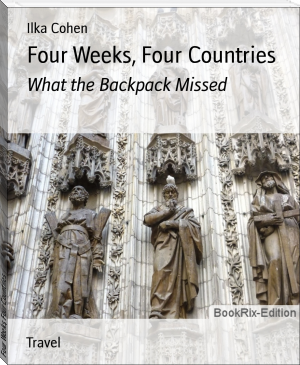East of Paris - Matilda Betham-Edwards (english readers .TXT) 📗

- Author: Matilda Betham-Edwards
Book online «East of Paris - Matilda Betham-Edwards (english readers .TXT) 📗». Author Matilda Betham-Edwards
A second Purgatory she styled the douches, and, doubtless, in those non-washing days, a second Purgatory it would have been to most folks.
To Pougues, nevertheless, we went, and if these notes induce the more enterprising of my countrypeople to do the same next summer, they are not likely to repent of the experiment. Never, indeed, was a little Eden of coolness, freshness, and greenery more abominably used by its sponsors, whilst the name of so many French townlings are a poem in themselves!
From a view of sky blue waters and smooth brown sands we were transported to a world of emerald green verdure and richest foliage, interpenetrated with golden light. On this 14th of September the warmth and dazzlingness of mid-summer still reigned at Pougues; and the scenery in which we suddenly found ourselves, bosquets, dells, and glades, with all the charm but without the savageness of the forest, recalled the loveliest lines of the laziest poet:--
"Was naught around but images of rest,
And flowery beds, that slumberous influence kest[1],
Sleep-soothing groves and quiet lawns between,
From poppies breathed; and beds of pleasant green."
[Footnote 1: Cast]
A drive of a few minutes had landed us in the heart of this little Paradise, baths and Casino standing in the midst of park-like grounds. Apparently Pougues, that is to say, the Pougues-les-Eaux of later days, has been cut out of natural woodland, the Casino gardens and its surroundings being rich in forest trees of superb growth and great variety. The wealth of foliage gives this new fashionable little watering-place an enticingly rural appearance, nor is the attraction of water wholly wanting. To quote once more a most quotable, if little read, poet:--
"Meantime, unnumbered glittering streamlets played,
And hurled everywhere their water's sheen,
That, as they bickered through the sunny glade,
Though restless still, themselves a lulling murmur made."
A pretty little lake, animated with swans, varies the woodland scenery, and tropical birds in an aviary lend brilliant bits of colour. The usual accessories of a health resort are, of course, here--reading room, concert hall, theatre, and other attractions, rapidly turning the place into a lesser Vichy. The number and magnificence of the hotels, the villas and _cottages_, that have sprung up on every side, bespeak the popularity of Pougues-les-Eaux, as it is now styled, the surname adding more dignity than harmoniousness. One advantage Pougues possesses over its rivals, is position. At Aix-les-Bains, Plombieres, Salins, and how many other inland spas, you are literally wedged in between shelving hills. If you want to enjoy wide horizons, and anything like a breeze, you must get well outside the town. Never in hot, dusty, crowded cities have I felt so half-suffocated as at the two first named places. Pougues, on the contrary, lies in a broad expanse of beautifully varied woodland and champaign, no more appropriate site conceivable for the now popular air-cure. "Pougues-les-Eaux, Cure d'Eau and Cure d'Air," is now its proud title, folks flocking hither, not only to imbibe its delicious, ice-cold, sparkling waters, but to drink in its highly nourishing air. The iron-gaseous waters resemble in properties those of Spa and Vichy. From one to five tumblers are ordered a day, according to the condition of the drinker, a little stroll between each dose being advisable. With regard to the air-cure, visitors are reminded that at Pougues they find the four kinds of walking exercise recommended by a German specialist, namely, that on quite level ground; secondly, a very gradual climb; thirdly, a somewhat steeper bit of up-hill; and, fourthly, the really arduous ascent of Mont Givre. In order to entice health-seekers, all kinds of gratifications await them on the summit, restaurant, dairy, reading room, tennis court, and croquet ground, to say nothing of a panorama almost unrivalled in eastern France. We have, indeed, climbed the Eiffel Tower, in other words, are on a level with that final stage from which floats the Tricolour. Looking east we behold the sombre Morvan and Nevers rising above the Loire, whilst westward, beyond the plain and the Loire, may be descried the cathedral of Bourges. How many regions visited and revisited by myself now lie before my eyes as on a map--the Berri, Georges Sand's country, the little Celtic kingdom of the Morvan, on the borders of which, for so many years, that charming writer, Philip Gilbert Hamerton, made his home; the Nivernais, with its souvenirs of Vert-Vert and Mazarin, or, rather, Mazarin and Vert-Vert, the Department of the Allier made from the ancient province of the Bourbonnais.
A wanderer in France should never be without his Arthur Young. That "wise and honest traveller," of course, had been before us, but travelling in a contrary direction. "From the hill that descends to Pougues," he wrote on his way from Nevers to Fontainebleau, in 1790, "is an extensive view to the north, and after Pouilly a (_sic_) fine scenery, with the Loire doubling through it." But the great farmer made this journey in mid-winter, thus missing its charm. And Arthur Young was ever too intent upon crops and roots to notice wild flowers. Had he traversed this region earlier in the year, he might have missed an exquisite feature, namely, the sweeps of autumn crocus. Just now the rich pastures around Pougues, as well as suburban lawns and wayside spaces, were tinted with delicate mauve, the ground being literally carpeted with these flowers. It was as if the lightest possible veil of pale purple covered the turf, the same profusion being visible on every side.
One final word about this sweet and most unmusically named place. On no occasion and nowhere have I been received with more cordiality than at dear little Pougues, a place I was told there utterly ignored by my country people. I do honestly believe, indeed, that myself and fellow traveller were the first English folk to wander about those delicious gardens, and taste the incomparable waters, cool, sparkling, invigorating as those of Spa.
One enterprising proprietor of an excellent hotel was so anxious to secure an English _clientele_, the best _clientele_ in the world, so hotel keepers aver, that she offered me a handsome percentage on any visitors I would send her. In the most delicate manner I could command, I gave her to understand that my inquiries about Pougues were not made from a business point of view, but that I should certainly proclaim its many attractions on the house-tops.
CHAPTER XI.
NEVERS AND MOULINS.
I found the well-remembered Hotel de France much as I had left it, just upon twenty years before, every whit as quiet, comfortable, and moderate in price, indeed, one of the best provincial hotels of France. The dear old woman then employed as waitress, had, of course, long since gone to her rest, and the landlord and landlady were new to me. But, the traditions of an excellent house were evidently kept up, accommodation, meanwhile, having been greatly enlarged.
A place is like a book; if worth knowing at all, to be returned to again and again. After the first brief visit so many years ago, I wrote, "I envy the traveller who for the first time stands on the bridge of Nevers." And more imposing, more exhilarating still, seemed the view from the same spot now; under the brilliant sky, in the clear atmosphere, every feature standing out as in a mosaic proudly dominating all, the Cathedral, with its mass of sombre architecture; stretching wide to right and left, the gay, prosperous-looking city; white villas rising one above the other, hanging gardens and terraced lawns, making greenery and verdure in mid-air. On the occasion of my first visit in August, 1881, the Loire was so low as to appear a mere thread of palest blue amid white sands; at the time I now write of, broad and beautiful it flowed beneath the noble bridge, a deep twilight sky reflected in its limpid waters.
How well I remember the first sight of this scene years ago! Then it was early morning of market day, and, pouring in from the country, I had met crowds of peasants with their products, the men in blue blouses, the women in neat white coiffes, some bearing huge baskets on their heads, others drawing heavily laden barrows, driving donkey-carts, the piled-up fruit and vegetables making a blaze of colour. For three sous I recorded the purchase of more wild strawberries, peaches, and greengages than I knew what to do with, each grower doing business on his own account, no middleman to share his profits; choicest fruit and vegetables to be had almost for the asking. On this lovely Sunday evening plenty of peasant folk were about, the men fishing in the Loire, the women minding their children under the trees. But I noted here, as elsewhere, a gradual disappearance of the blue blouse and white coiffe. Broadcloth and bonnets are fast superseding the homely, picturesque dress of former days.
The aerial residences just mentioned are characteristic of riverside Nevers. Craning our necks as we strolled to and fro, we remarked how much life in such altitudes must resemble that of a balloon, folks being thus lifted above the hubbub, malodours, and microbes of the human bee-hive below. For my own part I prefer a turnpike level, despite the engaging aspect of those rose-girt verandahs, bowers, and lawns on a level with the cathedral tower.
"Nevers makes a fine appearance, rising proudly from the Loire," wrote Arthur Young, "but on the first entrance it is like a thousand other places."
But the indefatigable apostle of the turnip had no time for archaeology on his great tour, or he would have discovered that Nevers possesses more than one architectural gem of the first water. The cathedral certainly, alike without and within, must take rank after those of Chartres, Le Mans, Reims, and how many others! but the exquisite little church of St. Etienne and the Ducal Palace, are both perfect in their way, and will enchant all lovers of harmony and proportion. The first, another specimen of so-called Romanesque-Burgundian, has to be looked for, standing as it does in a kind of _cul de sac_; the second occupies a conspicuous site, forms, indeed, the centre-piece and crowning ornament of the town. Daintiest of the dainty, this fairy-like Italian palace in the heart of France, reminds us that once upon a time Nevers was the seat of Italian dukes, the last of whom was a nephew of Mazarin. The great Cardinal, "whose heart was more French than his speech," and who served France so well, despite his nationality and his nepotism, having purchased the Nivernais of a Gonzague, finally incorporated it into the French crown in 1659.
To this day, Nevers remains true to its Italian traditions. Go into the tiniest suburban street,





Comments (0)